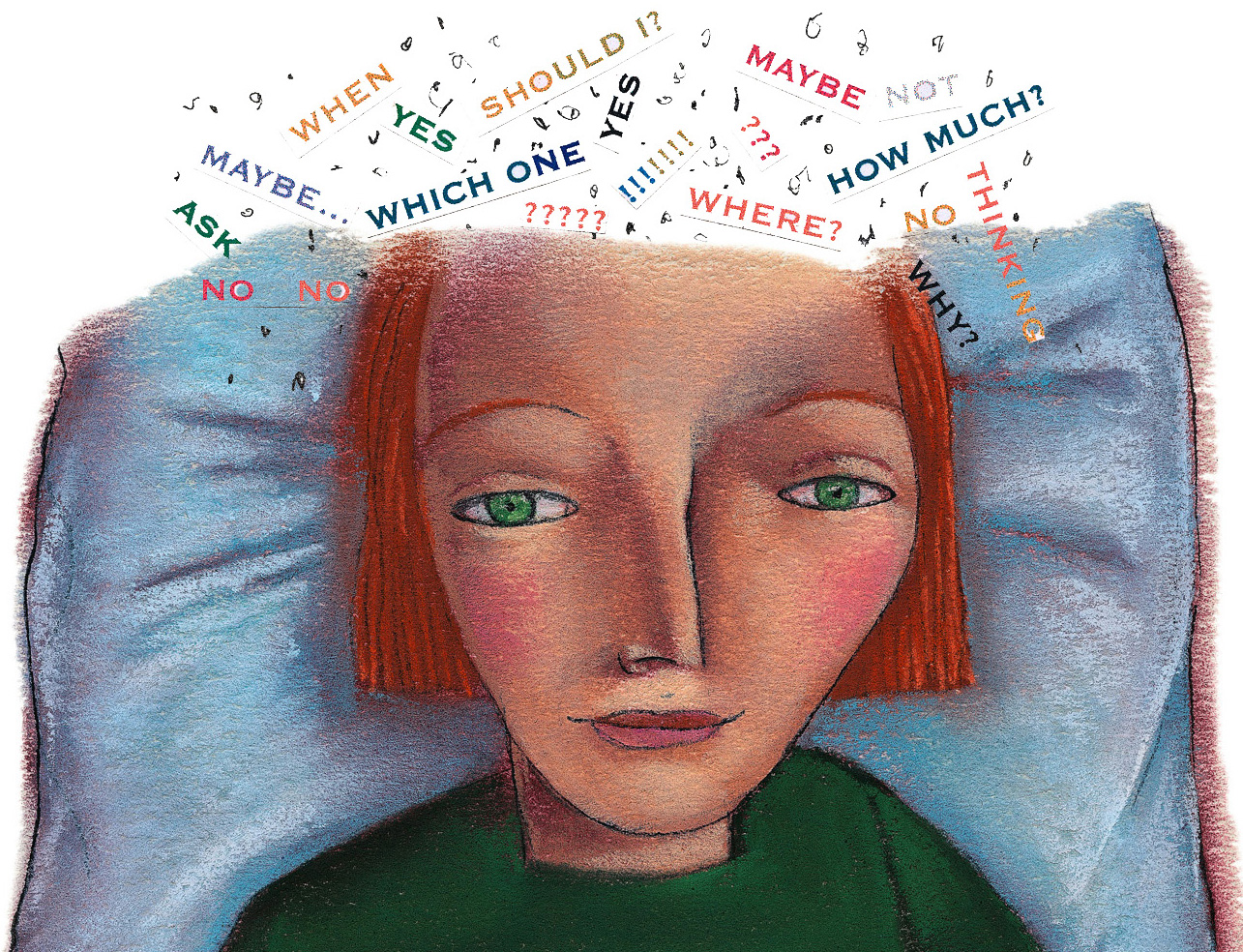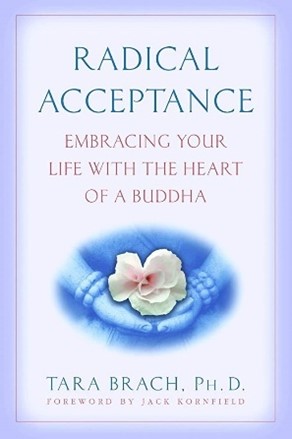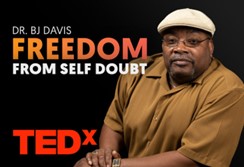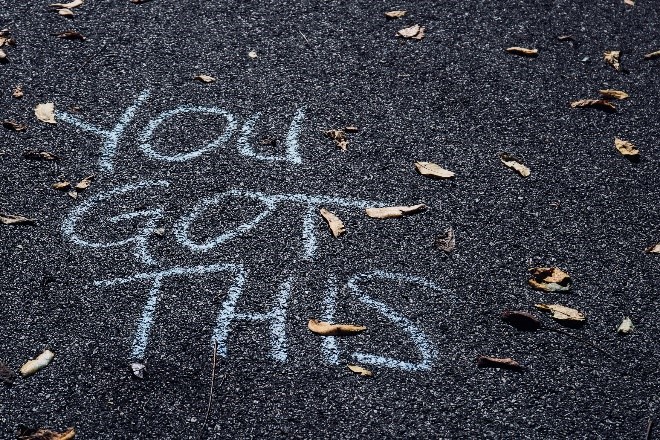We’ve all experienced self-doubt. We’ve felt uncertain about ourselves and our place in the world. Or we’ve questioned our capabilities and potential.
Any time we make a major mistake, we risk losing confidence. We may stop trusting ourselves as we feel wounded.
Self-doubt shows up as a voice in our head:
What if I make a mistake?
Or look like a fool?
What will people think of me?
At the root of self-doubt is fear—fear of failure or judgment. Sometimes we lose faith in ourselves.
Signs of Self-Doubt in Action
How to know if we struggle with self-doubt? When we’re experiencing it, we’re probably doing one or more of the following:
- feeling unsure about our capacity to address a challenge we’re facing
- often believing we’re not good enough
- being our own worst critic
- holding back and playing it safe to avoid risking failure
- frequently wondering what’s wrong with us
- engaging in overachieving (which can be a sign we’re working extra hard to avoid mistakes or failures)
- experiencing “imposter syndrome” (the fear of being viewed as a fraud or undeserving of our successes)
- having a hard time accepting compliments or giving ourselves credit
- people-pleasing to gain acceptance with others
- seeking reassurance excessively
- continually trying new self-improvement projects but never feeling adequate or satisfied
Where Self-Doubt Comes From
Self-doubt can come from many sources. For many of us, it begins in childhood. It can come from our parents, especially if we felt like we had to keep trying to prove ourselves and earn love through compliance or deeds—or if our parents criticized us excessively or were disapproving or distant. Self-doubt can also arise from frequent comparisons with siblings during childhood—or from overprotective parents, leaving us feeling like we’re not able to handle things ourselves.
There may also be others beyond parents—possibly teachers, coaches, mentors, or friends—who inadvertently contributed to our self-doubt. It can also originate from big failures or setbacks that we’ve experienced, or from abuse or trauma.
The Cost of Self-Doubt in Our Lives
Unfortunately, self-doubt exacts a steep price in our lives. It affects our happiness, relationships, work performance, and more. For example, self-doubt can:
- lower our motivation
- generate stress and anxiety
- cause us pain and despair
- sap our confidence
- diminish our resilience
- lead to procrastination
- foster indecisiveness
- lead to feeling overwhelmed
- inhibit our creativity
- make us unwilling or unable to take needed risks or pursue new opportunities
- lower our growth potential
- prevent us from serving others more effectively
- cause us to reject good options or lose opportunities because we feel we’re unworthy or incapable/
- prevent us from doing important things (such as going for a dream job or asking someone out)
- keep us from being our best and achieving excellence and success
- lead to a sense of malaise, unhappiness, or a life filled with regret
When we’re riddled with self-doubt, we don’t advocate on our behalf or ask tough questions. We don’t raise our hand, and we don’t negotiate as strongly about that pay raise. When we doubt ourselves, we don’t fight back or set boundaries. We hold back.
How to Overcome Self-Doubt
Given the enormous price we can pay for carrying self-doubt around with us, it’s well worth addressing it systematically and immediately.
There are many things we can do to overcome self-doubt, including:
- recall that having doubts is universal and that most people have a negativity bias and are their own harshest critic
- identify the source of our doubts, if possible (e.g., comments from a parent, or a bad experience)
- write down our positive qualities and accomplishments—and keep them in mind
- avoid comparing ourselves with others
- view ourselves through the perspective of someone who’s aware of our strengths—or ask them for feedback on our positive qualities and contributions
- tune out negative feedback that isn’t accurate—and take accurate feedback as a challenge to improve
- change our self-talk from negative to positive
- know and build on our strengths (the things in which we excel)
- develop ourselves systematically through intentional learning and personal development
- challenge our doubts regularly (e.g., when we’re doubting our capacities, ask ourselves what if the opposite were true—that we were highly capable)
- shift our focus from our doubts to our vision for what we’re trying to accomplish—and for whom, such as someone we’re motivated to fight for
- surround ourselves with people who believe in us, support us, embolden us, and bring out our best—including family, friends, colleagues, coaches, mentors, and small groups (while avoiding people who tear us down)
- work at building our courage and confidence
- focus more on areas of our capability and less on areas of weakness
- forgive ourselves for our mistakes and work on healing our wounds and letting go of old mental baggage that’s weighing us down
- give ourselves permission to be imperfect, since we all have issues and faults
- ask ourselves what we’d be doing now if we were committed and brave—and then start taking action in that direction
- imagine ourselves being successful in taking effective action
- build momentum by taking action* and making progress on meaningful work and goals (do this daily)
- take stock of the things we’ll miss out on if we don’t go for them
- gain clarity about our purpose and values to provide motivational fuel for achieving and honoring them
- love, connect with, and serve others (that will demonstrate to ourselves and others that we care and contribute)
- face our fears and in the process build a sense of capability and courage
- speak up and advocate for ourselves more, in the process re-branding ourselves as champions of our needs and interests
- imagine how much happier we’d be and how much more we could accomplish if we transformed our doubts into beliefs
- understand that all results begin with beliefs, because our beliefs turn into thoughts that drive our actions
- allow our progress and successes to inform our identity and be integrated into our heart (too often, we diminish our accomplishments)
- engage in consistent self-care practices, especially including exercise, since movement improves our mood and brain function
- cultivate gratitude for what we have instead of focusing on doubts and fears
- use an “alter ego” that gives us a sense of agency and power, like Beyonce’s Sasha Fierce, David Bowie’s Ziggy Stardust, or Eminem’s Slim Shady
- use affirmations (or mantras) to reassert and repeat our positive qualities and aspirations (e.g., “I am enough,” “I am capable,” “I got this”)—ideally with a daily affirmation practice
- keep a journal in which we allow ourselves to express our feelings openly, including not only doubts and concerns but also victories and celebrations
Though the list above is long, we only need to pick a few that resonate most and get started, then review and adjust. Action and progress will bring energy and motivation.
Overcoming Self-Doubt Isn’t about Arrogance and Conceit
Let’s be clear: overcoming self-doubt isn’t about becoming arrogant and conceited. Of course, it’s good to be aware of our weaknesses. Otherwise, we won’t be able to work on and hopefully overcome them. Humility is a virtue—and an important one.
Some degree of self-criticism can also serve as motivational fuel, inspiring us to work harder and improve. And some measure of self-doubt can be a virtue—helping us confront reality and earn wisdom the hard way.
But if we focus too much on our weaknesses, we lose sight of what we can actually do.
“For many of us, feelings of deficiency are right around the corner. It doesn’t take much—
just hearing of someone else’s accomplishments, being criticized, getting into an argument,
making a mistake at work—to make us feel that we are not okay….
When we experience our lives through this lens of personal insufficiency,
we are imprisoned in what I call the trance of unworthiness.”
-Tara Brach, Radical Acceptance
Conclusion: The Benefits of Addressing Self-Doubt
The benefits of overcoming self-doubt are remarkable. When we feel confident, we act differently. And these new actions can lead to wildly different outcomes. When we overcome self-doubt, we can become more decisive, easygoing, successful, and joyful. We can start shedding each doubt like it’s a crusty old snakeskin.
As we progress, we should watch out for falling back into well-worn patterns of self-doubt. We should be mindful and vigilant, checking to see if we’re able to maintain our newfound self-trust and confidence even when we make mistakes or experienced setbacks—or when we’re treated poorly by others.
In the end, self-trust—faith in our ability to cope with challenges—is what we want and need. When we take action in the face of our doubts, especially bold and decisive action, we dilute their potency and replace them with agency. If we can build on that cycle, it takes on a life of its own and changes everything.
The truth is that we’re highly capable and resilient—and that we always have been.
“You always had the power, my dear.
You just had to learn it for yourself.
You’ve had it all along.”
-Glinda the Good Witch to Dorothy in The Wizard of Oz

Reflection Questions
- To what extent are you wrestling with self-doubt?
- How is it affecting your wellbeing, enjoyment of life, and performance?
- What will you do about it, starting today?
“And when you get lost,
in the stormy moonless night,
may you trust, deeply trust,
as sage, ageless guide,
the true beautiful you.”
-Shirzad Chamine, Positive Intelligence
Tools for You
- Traps Test (Common Traps of Living) to help you identify what’s getting in the way of your happiness and quality of life
- Quality of Life Assessment to help you discover your strongest areas and the areas that need work and then act accordingly
- Personal Values Exercise to help you clarify what’s most important to you
Related Articles
- “The Mental Prisons We Build for Ourselves“
- “Breaking the Trance of Unworthiness”
- “How to Build Confidence in Ourselves and Our Leadership”
- “Getting Good at Overcoming Fear”
- “Do You Have Limiting Beliefs About Yourself?”
- “The Comparison Trap”
- “Feeling Behind”
- “How to Overcome Feelings of Helplessness”
- “Tired of Settling?”
- “Why We Stay in Bad Jobs too Long”
- “The Trap of Not Being Grateful for What We Have”
Recommended Videos
- Peter Sage, “How to Eliminate Self-Doubt Forever”
- B.J. Davis, “Freedom from Self-Doubt”
- Tara Brach, “Waking Up from the Trance of Unworthiness”
- Maya Angelou, “And Still I Rise” poem recitation
- Brene Brown, “The Power of Vulnerability”
- Carol Dweck, “The Power of Believing You Can Improve”
“…it was regaining my belief in myself that gave me power to change the direction in my life….
I’m living proof that a person’s past does not have to define their future.”
-Dr. B.J. Davis in his TEDx talk, “How to Eliminate Self-Doubt”
Postscript: Inspirations on Overcoming Self-Doubt
- “Our doubts are traitors, and make us lose the good we oft might win, by fearing to attempt.” -William Shakespeare, “Measure for Measure”
- “It’s not who you are that holds you back—it’s who you think you are not.” -Eric Thomas (a.k.a., ET, the Hip Hop Preacher)
- “Low self-esteem is like driving through life with your handbrake on.” -Maxwell Maltz
- “Remember, you have been criticizing yourself for years, and it hasn’t worked. Try approving of yourself and see what happens.” -Louise L. Hay
- “I don’t have to get rid of the fear, I just have to dance with it.” -Tony Robbins
- “All you need is already within you, only you must approach your self with reverence and love. Self-condemnation and self-distrust are grievous errors.” -Nisargadatta Maharaj
- “As soon as you trust yourself, you will know how to live.” -Johann Wolfgang von Goethe
- “Self-confidence is the first requisite to great undertakings.” -Samuel Johnson
- “Argue for your limitations, and sure enough they’re yours.” -Richard Bach
- “If I have lost confidence in myself, I have the universe against me.” -Ralph Waldo Emerson
- “If you have no confidence in self, you are twice defeated in the race of life. With confidence, you have won even before you have started.” -Cicero
- “The size of your success is determined by the size of your belief.” -David J. Schwartz
- “In order to change ourselves, we must first believe we can.” -Marie Forleo
- “The story of the human race is the story of men and women selling themselves short.” -Abraham Maslow
- “Too many of us are not living our dreams because we are living our fears.” -Les Brown
- “Man often becomes what he believes himself to be. If I keep on saying to myself that I cannot do a certain thing, it is possible that I may end by really becoming incapable of doing it. On the contrary, if I have the belief that I can do it, I shall surely acquire the capacity to do it even if I may not have it at the beginning.” -Mahatma Gandhi
- “Wholehearted living is about engaging in our lives from a place of worthiness. It means cultivating the courage, compassion, and connection to wake up in the morning and think, No matter what gets done and how much is left undone, I am enough. It’s going to bed at night thinking, Yes, I am imperfect and vulnerable and sometimes afraid, but that doesn’t change the truth that I am also brave and worthy of love and belonging.” -Brene Brown, The Gifts of Imperfection
* According to Dr. Margie Warrell, Senior Partner at Korn Ferry, “As research has found and experience has taught me, every time you take action in the presence of your doubts you dilute their power and amplify your own. Only when you dare to do the very thing you doubt you can do, will you realize how little you ever needed to doubt yourself to begin with.” Tony Robbins mapped out what he called the “success cycle,” in which we begin with potential, then take action, which gets results, which builds our belief in ourselves.
++++++++++++++++++++++++++++++
Gregg Vanourek is a writer, teacher, TEDx speaker, and coach on leadership and personal development. He is co-author of three books, including LIFE Entrepreneurs: Ordinary People Creating Extraordinary Lives (a manifesto for integrating our life and work with purpose, passion, and contribution) and Triple Crown Leadership: Building Excellent, Ethical, and Enduring Organizations (a winner of the International Book Awards). Check out his Best Articles or get his monthly newsletter. If you found value in this article, please forward it to a friend. Every little bit helps!
















